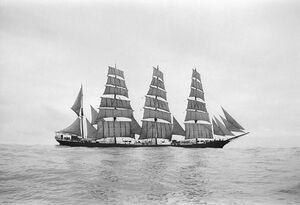Parma (barque)
Topic: Engineering
 From HandWiki - Reading time: 3 min
From HandWiki - Reading time: 3 min
 Parma in 1932
Script error: The function "infobox_ship_career" does not exist. | |
| General characteristics | |
|---|---|
| Tonnage: | |
| Length: | 327 ft 7 in (99.85 m) |
| Beam: | 46 ft 5 in (14.15 m) |
| Draught: | 28 ft (8.53 m) |
| Depth: | 26 ft 2 in (7.98 m) |
| Propulsion: | sail |
| Sail plan: | Barque |

Parma was a four-masted steel-hulled barque which was built in 1902 as Arrow for the Anglo-American Oil Co Ltd, London. In 1912 she was sold to F. Laeisz, Hamburg, Germany . During the First World War she was interned in Chile , and postwar was assigned to the United Kingdom as war reparations. She was sold back to Laiesz in 1921. She was sold in 1931 to Ruben De Cloux & Alan Villiers of Mariehamn, Finland . Following an accident in 1936, she was sold and hulked at Haifa, British Mandate of Palestine, now Israel, for two years before being scrapped.
Description
Arrow was built by A Rodger & Co, Port Glasgow as yard number 361. She was 327 feet 7 inches (99.85 m) long, with a beam of 46 feet 5 inches (14.15 m) and a depth of 26 feet 2 inches (7.98 m).[1] She had four masts and was rigged as a barque, with royal sails over double top and topgallant sails.[2] Arrow was completed in April 1902.[3] She was a sister ship to Eclipse, which was completed two months later.[4]
History
Arrow entered service with the Anglo-American Oil Co Ltd, London, employed in the kerosene trade.[5] In 1912, she was sold to F Laeisz, Hamburg for £15,000 and was renamed Parma.[2] She was employed in the nitrate trade between Germany and Chile .[6] At the outbreak of the First World War, Parma was interned at Iquique, Chile. In 1920, she was assigned to the United Kingdom as war reparations.[2] In 1921, she was transferred to the Belgian Government, and placed under the management of Association Maritime Belge, Antwerp.[1] On 8 November 1921, Parma was sold back to F Laeisz for £10,000 stg.[2] She was again employed in the nitrate trade.[6] In 1926, Parma sailed from Hamburg to Talcahuano, Chile in 86 days and in 1928 she sailed from Land's End to Talcahuano in 70 days.[2]
In 1931, Parma was sold to Ruben De Cloux and Alan Villiers of Mariehamn, Finland for 34,000 ℛℳ.[2] She was the largest sailing ship under the Finnish flag at the time,[6] holding that position until 1935 when Gustaf Erikson bought Moshulu.[7] She was employed in the wheat trade between Germany and Australia . In 1933, she sailed from Port Victoria to Falmouth in 83 days. This was the fastest ever achieved by a sailing ship.[6]
On 1 July 1936, Parma collided with an observation tower at Princes Dock, Glasgow when a gust of wind caught her as she was docking. As a result of the collision, plates in her hull were sprung open by falling coping stones from the quayside. Parma was sold to Rederei A/B Parma U V Wennstrom, Mariehamn.[5] She was stripped of her masts and rigging,[2] and converted to a hulk. In 1936, Parma was sold to Barnett Bros, London.[5] Parma served as a hulk at Haifa, Palestine (now Israel), until 1938 when she was scrapped.[2] A model of Parma can be seen at the Ålands Sjöfartsmuseum, Mariehamn.[8]
Captains
The captains of Parma were:-[2][6]
- Töpper (1924–26)
- Holst (1926–27)
- Rohwer (1928–29)
- Brockhöft (1928–29)
- Ruben de Cloux (1931–36)
Official Numbers and Code Letters
Official Numbers were a forerunner to IMO Numbers. Parma was assigned the United Kingdom Official Number 115804,[9] she was also assigned the Finnish Official Number 324.[10]
Parma was assigned the Code Letters RBWN when she was under the German Flag,[3] and OHQQ when she was under the Finnish Flag.[10]
References
- ↑ 1.0 1.1 "P-Z". Belgian ships. Archived from the original on September 24, 2008. https://web.archive.org/web/20080924063030/http://www.belgian-ships.be/p-z.htm. Retrieved 4 February 2010.
- ↑ 2.0 2.1 2.2 2.3 2.4 2.5 2.6 2.7 2.8 "Arrow". Lars Bruzelius. http://www.bruzelius.info/Nautica/Ships/Fourmast_ships/Arrow%281902%29.html. Retrieved 4 February 2010.
- ↑ 3.0 3.1 "LLOYD'S REGISTER, NAVIRES A VOILES". Plimsoll Ship Data. https://plimsoll.southampton.gov.uk/shipdata/pdfs/30/30a0158.pdf. Retrieved 4 February 2010.
- ↑ "LLOYD'S REGISTER, SAILING VESSELS". Plimsoll Ship Data. https://plimsoll.southampton.gov.uk/shipdata/pdfs/30/30a0121.pdf. Retrieved 4 February 2010.
- ↑ 5.0 5.1 5.2 "ARROW(1902)". Clydesite. http://www.clydesite.co.uk/clydebuilt/viewship.asp?id=14543. Retrieved 4 February 2010.
- ↑ 6.0 6.1 6.2 6.3 6.4 "Arrow". Oktett. http://sailing-ships.oktett.net/4.html. Retrieved 4 February 2010.
- ↑ "Kurt". Oktett. http://sailing-ships.oktett.net/15.html. Retrieved 4 February 2010.
- ↑ "End of the sail age". Pamir. http://pamir.perso.infonie.fr/Voiliers/Classe_A/Pamir/Erikson/Finwe.htm. Retrieved 14 February 2010.
- ↑ "LLOYD'S REGISTER, SAILING VESSELS". Plimsoll Ship Data. https://plimsoll.southampton.gov.uk/shipdata/pdfs/36/36a0788.pdf. Retrieved 4 February 2010.
- ↑ 10.0 10.1 "LLOYD'S REGISTER, NAVIRES A VOILES". Plimsoll Ship Data. https://plimsoll.southampton.gov.uk/shipdata/pdfs/35/35a0780.pdf. Retrieved 4 February 2010.
 |
 KSF
KSF